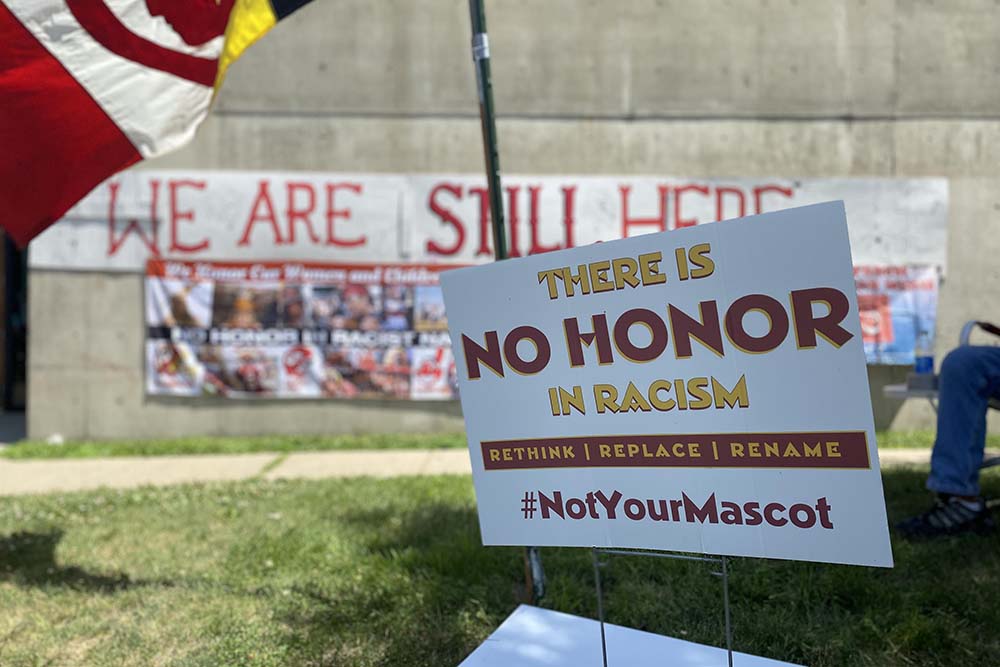
- Details
- By Levi Rickert
Opinion. President Donald Trump has long demonstrated a talent for distraction — often redirecting public attention whenever an issue arises that he would rather avoid.
That appears to be the case with the ongoing controversy surrounding the Jeffrey Epstein files, which continues to put pressure on the White House. In response, Trump has attempted to deflect by accusing former President Barack Obama of treason over his handling of Russian interference in the 2016 election—an unsubstantiated claim that seems designed more to distract than to inform.
In another diversion, Trump revived debate over the name of Washington's NFL team, which dropped the racially insensitive "Redsk!ns" name five years ago. At the same time, he weighed in on the Cleveland Guardians name shift from Indians.
The Epstein scandal has coincided with a sharp drop in Trump’s approval ratings. According to Gallup, just 37% of Americans currently approve of his job performance — the lowest mark of his second term. Given this context, it’s not surprising that Trump would be eager to shift focus away from the Epstein revelations.
However, Trump is misguided in his stance on presidential involvement in the naming of sports teams — particularly when it concerns the misappropriation of Native American names and imagery.
His position has shifted since 2013, when President Obama remarked in an Associated Press interview that, if he owned the Washington NFL team, he would change its name. At the time, Trump responded with a tweet:
“Presidents should not be telling the Washington Redskins to change their name-our country has far bigger problems! FOCUS on them, not nonsense.”
Now, Trump says he wants to Make Indians Great Again. In a Truth social media post, Trump called the NFL’s name Commanders as “dumb” and claimed that “all Indian people” wanted the old one restored.
This is where the president gets it wrong. While he often speaks in exaggerated terms, the truth is that not all Native Americans want to bring back a name widely recognized as racist.
I’m not sure who President Trump consults on this issue, but I regularly speak with national Native American leaders — and I can say with confidence that they overwhelmingly oppose the use of Native mascots and imagery in sports.
Last Monday, in response to Trump’s Sunday post, the National Congress of American Indians — the largest and oldest Native American advocacy organization — reaffirmed the position it has held since 1950: Native-themed mascots are harmful and unacceptable.
“Any attempt to distract by invoking our names and purporting to speak for our communities is an affront to Tribal sovereignty and is not taken lightly. For 75 years, NCAI has held an unbroken voice: Imagery and fan behaviors that mock, demean, and dehumanize Native people have no place in modern society. NCAI will continue to stand in support of the dignity and humanity of Native peoples,” said NCAI President Mark Macarro.
On Thursday, the National Indian Health Board (NIHB), the leading Native American health organization, released a statement that called Trump’s attempt to resurrect the harmful narrative for political gain as dangerous. NIHB maintains that our names and identities are sacred.
NIHB cited research by the American Psychological Association (APA) that shows what Native people have always known: exposure to Native mascots leads to lower self-esteem and a diminished sense of potential among Native youth. The APA, U.S. Commission on Civil Rights, and countless tribal nations have all called for the permanent retirement of Native-themed mascots, recognizing them as a form of racial discrimination with real-world mental health consequences.
President Trump should consult with respected national Native American leaders regarding the issue of mascots. Native communities are not monolithic — not all Indians want to go backward on this issue.
If the president is truly committed to supporting Native Americans, he must honor the federal government's trust and treaty obligations to tribal nations — legal commitments that require adequate funding for essential services, not devastating budget cuts that abandon these sacred agreements.
If he is serious, he should reverse the nearly 90% funding cut to tribal colleges and universities proposed in his fiscal year 2026 budget. Education is widely recognized by social scientists as the most effective pathway out of poverty.
If he is serious, he must restore the $107 million — approximately a 20% cut — proposed for tribal law enforcement in the 2026 budget.
Trump should go back to his 2013 position: Presidents do have more important matters to consider. He can start with releasing the Epstein files.
Thayék gde nwéndëmen - We are all related.
More Stories Like This
The SAVE America Act Threatens Native Voting Rights — We Must Fight BackThe Presidential Election of 1789
Cherokee Nation: Telling the Full Story During Black History Month
Jesse Jackson Changed Politics for the Better
Native News Online at 15: Humble Beginnings, Unwavering Mission
Help us defend tribal sovereignty.
At Native News Online, our mission is rooted in telling the stories that strengthen sovereignty and uplift Indigenous voices — not just at year’s end, but every single day.
Because of your generosity last year, we were able to keep our reporters on the ground in tribal communities, at national gatherings and in the halls of Congress — covering the issues that matter most to Indian Country: sovereignty, culture, education, health and economic opportunity.
That support sustained us through a tough year in 2025. Now, as we look to the year ahead, we need your help right now to ensure warrior journalism remains strong — reporting that defends tribal sovereignty, amplifies Native truth, and holds power accountable.
 The stakes couldn't be higher. Your support keeps Native voices heard, Native stories told and Native sovereignty defended.
The stakes couldn't be higher. Your support keeps Native voices heard, Native stories told and Native sovereignty defended.
Stand with Warrior Journalism today.
Levi Rickert (Potawatomi), Editor & Publisher


